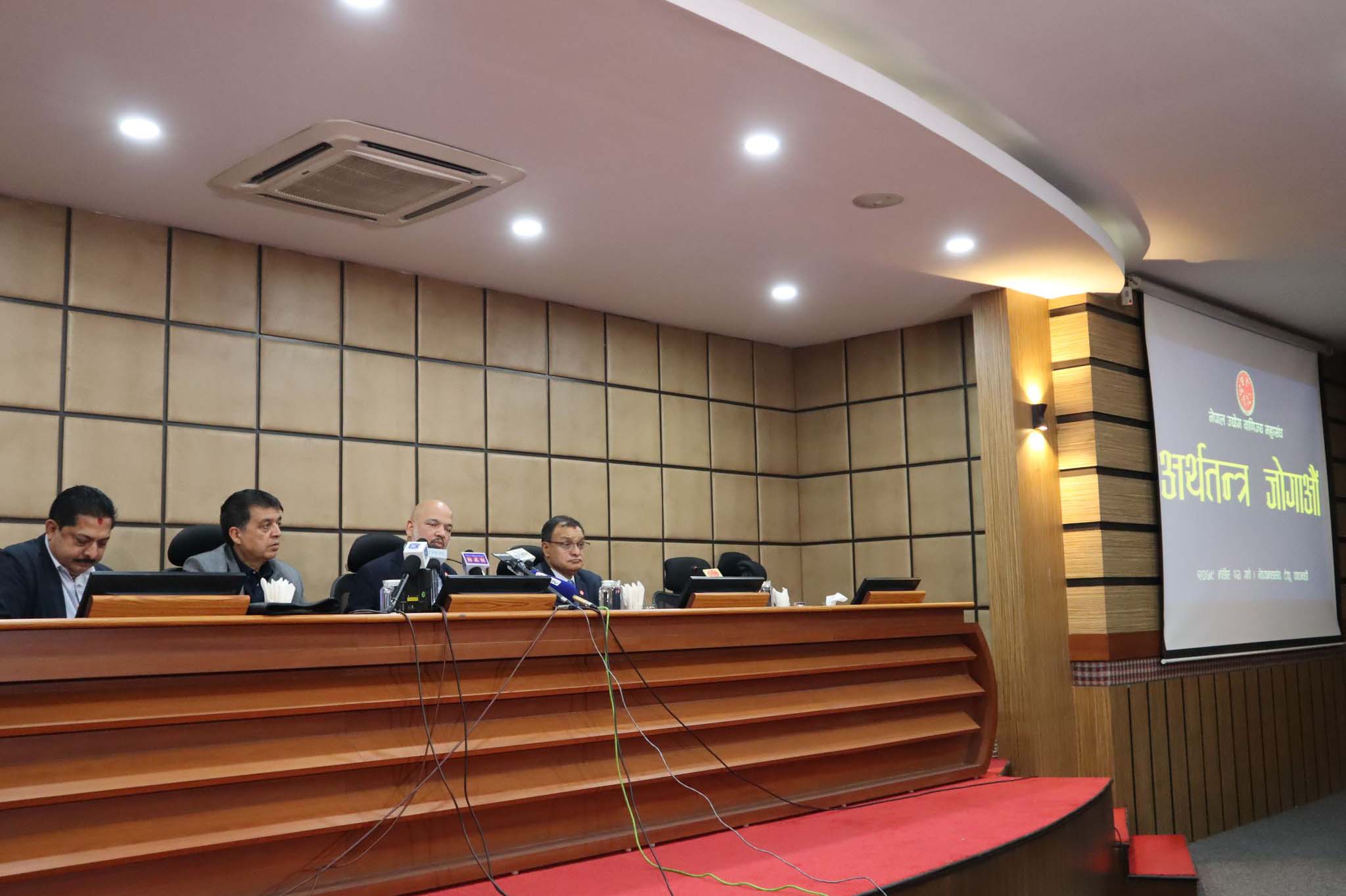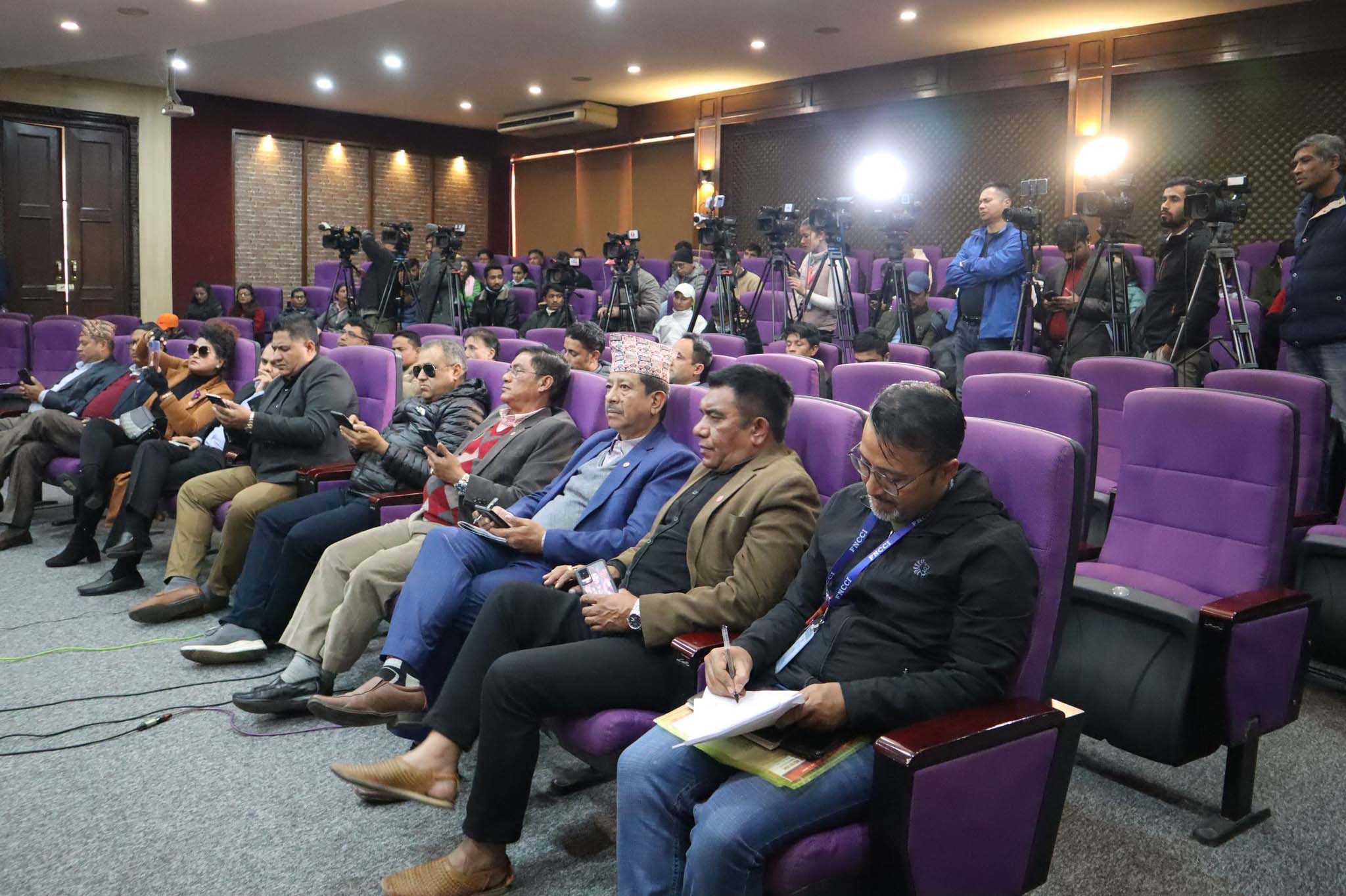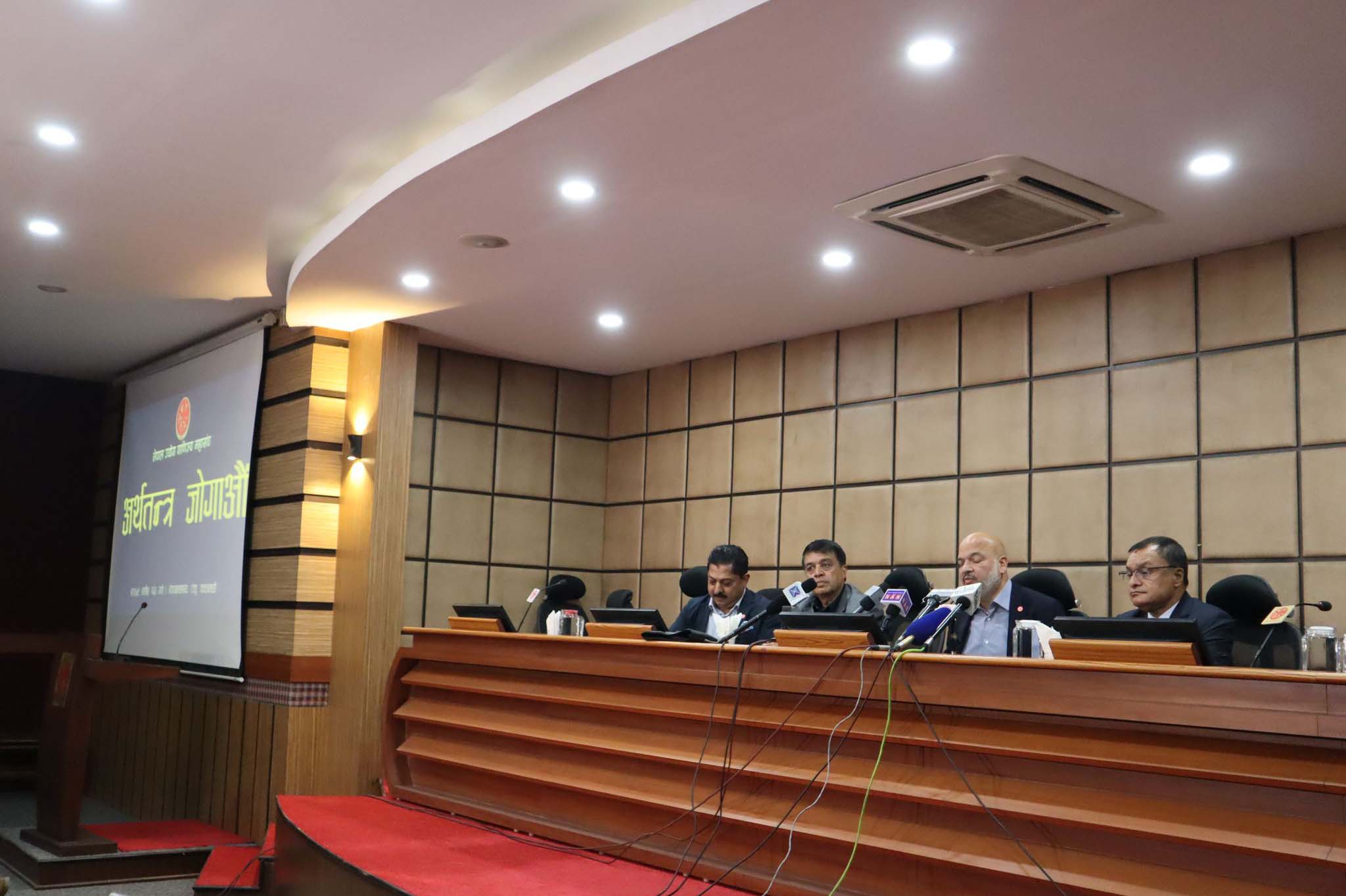
KATHMANDU: The government, general public and the private sector are all negatively affected which is a state of despair in the economy, according to Federation of Nepalese Chambers of Commerce and Industry (FNCCI) President Shekhar Golchha.
At a press conference organised with the title 'Let's Save Economy' by FNCCI in Kathmandu on Tuesday, Golchha expressed, the situation is such that if we are not careful, the economy will crash. The regular production and supply in the market ensure the revenue of the government, employment of the people and maintaining the price within certain limits, he opined.
Addressing the programme, Golchha said, after the Covid 19 pandemic, there were signs of improvement in the economy. Based on the first five months of the fiscal year 2021/22, the Central Bureau of Statistics (CBS) had projected an economic growth of 5.84% which was unnatural.
Golchha opined, "The existing structure of the economy could not handle the high demand. Naturally, the need for loans in the financial sector has increased as the demand increased in real estate, capital market, and manufacturing sector." He further added, "With the increase in demand, imports also increased owing to low-scale production capacity within the country."
[caption id="attachment_31139" align="alignnone" width="2048"] Stakeholders and representatives of private sectors attend a programme titled 'Let's Save Economy' organised by Federation of Nepalkese Chambers of Commerce and Industry in Kathmandu, on Tuesday, November 29, 2022.[/caption]
According to the survey conducted by FNCCI, under the construction sector, industries such as cement and iron rods are operating at an average capacity of 30%. The sale of daily consumable goods has decreased by 18%. The business of electrical appliances has contracted by 55%. Golchha highlighted that the ban on imports has mostly affected automobiles with the business decreasing by about 75% while the insurance business has also contracted by 30%.
Since the market has contracted, the revenue has decreased by 19% in the first three months of the current fiscal year 2022/23. The recurrent expenditure exceeds the collected revenue by Rs 17 billion. Golchha expressed his view that until the end of the current FY, if the expenditure continues to increase when the revenue is not collected, there will be a situation where government employees will have to take internal or external loans to pay the employees' salaries. Such debt will eventually have to be paid by the general public.
He said the FNCCI has been making public its opinion time and again, and drawing attention of the central bank to the guidelines implemented since October 2022 which it believes will have an adverse effect on the country's enterprise business.
FNCCI has demanded to postpone the implementation of the guidelines for at least two years, and take initiative to reform the system that has been affecting the private sector.
The private sectors' association has expressed its hope that the central bank will be positive on the issue as the economy is now demanding promotional reforms from the regulatory bodies.
The FNCCI has also demanded liquidity management and interest rate stability. Stating that the arrangement requiring to maintain the average interest rate gap of commercial banks from 4.4% to 4% and the average interest rate gap of development banks and financial institutions from 5% to 4.6% prevented the interest rate from rising, FNCCI thanked the central bank for such arrangement through the monetary policy review and demanded its implementation soon.
FNCCI President Golchha opined that both the government and the central bank should find a way to resolve the liquidity crisis and reduce interest rates.
[caption id="attachment_31137" align="alignnone" width="2048"]
Stakeholders and representatives of private sectors attend a programme titled 'Let's Save Economy' organised by Federation of Nepalkese Chambers of Commerce and Industry in Kathmandu, on Tuesday, November 29, 2022.[/caption]
According to the survey conducted by FNCCI, under the construction sector, industries such as cement and iron rods are operating at an average capacity of 30%. The sale of daily consumable goods has decreased by 18%. The business of electrical appliances has contracted by 55%. Golchha highlighted that the ban on imports has mostly affected automobiles with the business decreasing by about 75% while the insurance business has also contracted by 30%.
Since the market has contracted, the revenue has decreased by 19% in the first three months of the current fiscal year 2022/23. The recurrent expenditure exceeds the collected revenue by Rs 17 billion. Golchha expressed his view that until the end of the current FY, if the expenditure continues to increase when the revenue is not collected, there will be a situation where government employees will have to take internal or external loans to pay the employees' salaries. Such debt will eventually have to be paid by the general public.
He said the FNCCI has been making public its opinion time and again, and drawing attention of the central bank to the guidelines implemented since October 2022 which it believes will have an adverse effect on the country's enterprise business.
FNCCI has demanded to postpone the implementation of the guidelines for at least two years, and take initiative to reform the system that has been affecting the private sector.
The private sectors' association has expressed its hope that the central bank will be positive on the issue as the economy is now demanding promotional reforms from the regulatory bodies.
The FNCCI has also demanded liquidity management and interest rate stability. Stating that the arrangement requiring to maintain the average interest rate gap of commercial banks from 4.4% to 4% and the average interest rate gap of development banks and financial institutions from 5% to 4.6% prevented the interest rate from rising, FNCCI thanked the central bank for such arrangement through the monetary policy review and demanded its implementation soon.
FNCCI President Golchha opined that both the government and the central bank should find a way to resolve the liquidity crisis and reduce interest rates.
[caption id="attachment_31137" align="alignnone" width="2048"] Federation of Nepalese Chambers of Commerce and Industry (FNCCI) President Shekhar Golchha, Senior Vice President Chandra Prasad Dhakal among other members attend a programme in Kathmandu, on Tuesday, November 29, 2022.[/caption]
Golchha expressed his confidence that if the FNCCI's suggestions are implemented it will reduce the liquidity crunch in the market. "If the interest rate is reduced and oriented towards stability, the investment will increase and the confidence in the private sector will also increase," said Golchha and added, "When the production starts increasing, employment will be created and the purchasing power of the common people will increase. Which will increase the revenue and the country will move towards economic stability."
Present on the occasion were FNCCI senior Vice President Chandra Prasad Dhakal, Vice Presidents Dinesh Shrestha, Anjan Shrestha and Executive Committee members.
READ ALSO:
Federation of Nepalese Chambers of Commerce and Industry (FNCCI) President Shekhar Golchha, Senior Vice President Chandra Prasad Dhakal among other members attend a programme in Kathmandu, on Tuesday, November 29, 2022.[/caption]
Golchha expressed his confidence that if the FNCCI's suggestions are implemented it will reduce the liquidity crunch in the market. "If the interest rate is reduced and oriented towards stability, the investment will increase and the confidence in the private sector will also increase," said Golchha and added, "When the production starts increasing, employment will be created and the purchasing power of the common people will increase. Which will increase the revenue and the country will move towards economic stability."
Present on the occasion were FNCCI senior Vice President Chandra Prasad Dhakal, Vice Presidents Dinesh Shrestha, Anjan Shrestha and Executive Committee members.
READ ALSO:
 Stakeholders and representatives of private sectors attend a programme titled 'Let's Save Economy' organised by Federation of Nepalkese Chambers of Commerce and Industry in Kathmandu, on Tuesday, November 29, 2022.[/caption]
According to the survey conducted by FNCCI, under the construction sector, industries such as cement and iron rods are operating at an average capacity of 30%. The sale of daily consumable goods has decreased by 18%. The business of electrical appliances has contracted by 55%. Golchha highlighted that the ban on imports has mostly affected automobiles with the business decreasing by about 75% while the insurance business has also contracted by 30%.
Since the market has contracted, the revenue has decreased by 19% in the first three months of the current fiscal year 2022/23. The recurrent expenditure exceeds the collected revenue by Rs 17 billion. Golchha expressed his view that until the end of the current FY, if the expenditure continues to increase when the revenue is not collected, there will be a situation where government employees will have to take internal or external loans to pay the employees' salaries. Such debt will eventually have to be paid by the general public.
He said the FNCCI has been making public its opinion time and again, and drawing attention of the central bank to the guidelines implemented since October 2022 which it believes will have an adverse effect on the country's enterprise business.
FNCCI has demanded to postpone the implementation of the guidelines for at least two years, and take initiative to reform the system that has been affecting the private sector.
The private sectors' association has expressed its hope that the central bank will be positive on the issue as the economy is now demanding promotional reforms from the regulatory bodies.
The FNCCI has also demanded liquidity management and interest rate stability. Stating that the arrangement requiring to maintain the average interest rate gap of commercial banks from 4.4% to 4% and the average interest rate gap of development banks and financial institutions from 5% to 4.6% prevented the interest rate from rising, FNCCI thanked the central bank for such arrangement through the monetary policy review and demanded its implementation soon.
FNCCI President Golchha opined that both the government and the central bank should find a way to resolve the liquidity crisis and reduce interest rates.
[caption id="attachment_31137" align="alignnone" width="2048"]
Stakeholders and representatives of private sectors attend a programme titled 'Let's Save Economy' organised by Federation of Nepalkese Chambers of Commerce and Industry in Kathmandu, on Tuesday, November 29, 2022.[/caption]
According to the survey conducted by FNCCI, under the construction sector, industries such as cement and iron rods are operating at an average capacity of 30%. The sale of daily consumable goods has decreased by 18%. The business of electrical appliances has contracted by 55%. Golchha highlighted that the ban on imports has mostly affected automobiles with the business decreasing by about 75% while the insurance business has also contracted by 30%.
Since the market has contracted, the revenue has decreased by 19% in the first three months of the current fiscal year 2022/23. The recurrent expenditure exceeds the collected revenue by Rs 17 billion. Golchha expressed his view that until the end of the current FY, if the expenditure continues to increase when the revenue is not collected, there will be a situation where government employees will have to take internal or external loans to pay the employees' salaries. Such debt will eventually have to be paid by the general public.
He said the FNCCI has been making public its opinion time and again, and drawing attention of the central bank to the guidelines implemented since October 2022 which it believes will have an adverse effect on the country's enterprise business.
FNCCI has demanded to postpone the implementation of the guidelines for at least two years, and take initiative to reform the system that has been affecting the private sector.
The private sectors' association has expressed its hope that the central bank will be positive on the issue as the economy is now demanding promotional reforms from the regulatory bodies.
The FNCCI has also demanded liquidity management and interest rate stability. Stating that the arrangement requiring to maintain the average interest rate gap of commercial banks from 4.4% to 4% and the average interest rate gap of development banks and financial institutions from 5% to 4.6% prevented the interest rate from rising, FNCCI thanked the central bank for such arrangement through the monetary policy review and demanded its implementation soon.
FNCCI President Golchha opined that both the government and the central bank should find a way to resolve the liquidity crisis and reduce interest rates.
[caption id="attachment_31137" align="alignnone" width="2048"] Federation of Nepalese Chambers of Commerce and Industry (FNCCI) President Shekhar Golchha, Senior Vice President Chandra Prasad Dhakal among other members attend a programme in Kathmandu, on Tuesday, November 29, 2022.[/caption]
Golchha expressed his confidence that if the FNCCI's suggestions are implemented it will reduce the liquidity crunch in the market. "If the interest rate is reduced and oriented towards stability, the investment will increase and the confidence in the private sector will also increase," said Golchha and added, "When the production starts increasing, employment will be created and the purchasing power of the common people will increase. Which will increase the revenue and the country will move towards economic stability."
Present on the occasion were FNCCI senior Vice President Chandra Prasad Dhakal, Vice Presidents Dinesh Shrestha, Anjan Shrestha and Executive Committee members.
READ ALSO:
Federation of Nepalese Chambers of Commerce and Industry (FNCCI) President Shekhar Golchha, Senior Vice President Chandra Prasad Dhakal among other members attend a programme in Kathmandu, on Tuesday, November 29, 2022.[/caption]
Golchha expressed his confidence that if the FNCCI's suggestions are implemented it will reduce the liquidity crunch in the market. "If the interest rate is reduced and oriented towards stability, the investment will increase and the confidence in the private sector will also increase," said Golchha and added, "When the production starts increasing, employment will be created and the purchasing power of the common people will increase. Which will increase the revenue and the country will move towards economic stability."
Present on the occasion were FNCCI senior Vice President Chandra Prasad Dhakal, Vice Presidents Dinesh Shrestha, Anjan Shrestha and Executive Committee members.
READ ALSO:
Published Date: November 30, 2022, 12:00 am
Post Comment
E-Magazine
RELATED B360 National


-1766317786.jpeg)
-1766315775.jpeg)

-1766310221.jpeg)